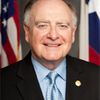Dwayne Collins
Dwayne Collins (Republican Party) (also known as Doc) ran for election to the Texas House of Representatives to represent District 2. He lost in the Republican primary on March 3, 2020.
Collins was a district-level delegate to the 2016 Republican National Convention from Texas. Collins was one of 104 delegates from Texas bound by state party rules to support Ted Cruz at the convention.[1]
Elections
2020
See also: Texas House of Representatives elections, 2020
General election
General election for Texas House of Representatives District 2
Bryan Slaton defeated Bill Brannon in the general election for Texas House of Representatives District 2 on November 3, 2020.
Candidate | % | Votes | ||
| ✔ |  | Bryan Slaton (R) | 81.3 | 63,074 |
| Bill Brannon (D) | 18.7 | 14,514 | ||
| Total votes: 77,588 | ||||
 = candidate completed the Ballotpedia Candidate Connection survey. = candidate completed the Ballotpedia Candidate Connection survey. | ||||
| If you are a candidate and would like to tell readers and voters more about why they should vote for you, complete the Ballotpedia Candidate Connection Survey. | ||||
Do you want a spreadsheet of this type of data? Contact our sales team. | ||||
Republican primary runoff election
Republican primary runoff for Texas House of Representatives District 2
Bryan Slaton defeated incumbent Dan Flynn in the Republican primary runoff for Texas House of Representatives District 2 on July 14, 2020.
Candidate | % | Votes | ||
| ✔ |  | Bryan Slaton | 61.1 | 9,772 |
 | Dan Flynn | 38.9 | 6,229 | |
| Total votes: 16,001 | ||||
 = candidate completed the Ballotpedia Candidate Connection survey. = candidate completed the Ballotpedia Candidate Connection survey. | ||||
| If you are a candidate and would like to tell readers and voters more about why they should vote for you, complete the Ballotpedia Candidate Connection Survey. | ||||
Do you want a spreadsheet of this type of data? Contact our sales team. | ||||
Democratic primary election
Democratic primary for Texas House of Representatives District 2
Bill Brannon advanced from the Democratic primary for Texas House of Representatives District 2 on March 3, 2020.
Candidate | % | Votes | ||
| ✔ | Bill Brannon | 100.0 | 4,408 | |
| Total votes: 4,408 | ||||
 = candidate completed the Ballotpedia Candidate Connection survey. = candidate completed the Ballotpedia Candidate Connection survey. | ||||
| If you are a candidate and would like to tell readers and voters more about why they should vote for you, complete the Ballotpedia Candidate Connection Survey. | ||||
Do you want a spreadsheet of this type of data? Contact our sales team. | ||||
Republican primary election
Republican primary for Texas House of Representatives District 2
Incumbent Dan Flynn and Bryan Slaton advanced to a runoff. They defeated Dwayne Collins in the Republican primary for Texas House of Representatives District 2 on March 3, 2020.
Candidate | % | Votes | ||
| ✔ |  | Dan Flynn | 44.8 | 12,246 |
| ✔ |  | Bryan Slaton | 36.1 | 9,889 |
 | Dwayne Collins | 19.1 | 5,223 | |
| Total votes: 27,358 | ||||
 = candidate completed the Ballotpedia Candidate Connection survey. = candidate completed the Ballotpedia Candidate Connection survey. | ||||
| If you are a candidate and would like to tell readers and voters more about why they should vote for you, complete the Ballotpedia Candidate Connection Survey. | ||||
Do you want a spreadsheet of this type of data? Contact our sales team. | ||||
Campaign finance
Campaign themes
2020
Ballotpedia survey responses
See also: Ballotpedia's Candidate Connection
Dwayne Collins did not complete Ballotpedia's 2020 Candidate Connection survey.
2016 Republican National Convention
- See also: Republican National Convention, 2016
| Dwayne Collins | |
| Republican National Convention, 2016 | |
| Status: | District-level delegate |
| Congressional district: | 5 |
| State: | Texas |
| Bound to: | Ted Cruz |
| Delegates to the RNC 2016 | |
| Calendar and delegate rules overview • Types of delegates • Delegate rules by state • State election law and delegates • Delegates by state | |
Collins was a district-level delegate to the 2016 Republican National Convention from Texas. Collins was one of 104 delegates from Texas bound by state party rules to support Ted Cruz at the convention.[2] Cruz suspended his campaign on May 3, 2016. At the time, he had approximately 546 bound delegates. For more on what happened to his delegates, see this page.
Texas primary results
- See also: Presidential election in Texas, 2016
| Texas Republican Primary, 2016 | ||||
|---|---|---|---|---|
| Candidate | Vote % | Votes | Delegates | |
| Jeb Bush | 1.2% | 35,420 | 0 | |
| Ben Carson | 4.2% | 117,969 | 0 | |
| Chris Christie | 0.1% | 3,448 | 0 | |
| 43.8% | 1,241,118 | 104 | ||
| Carly Fiorina | 0.1% | 3,247 | 0 | |
| Lindsey Graham | 0.1% | 1,706 | 0 | |
| Elizabeth Gray | 0.2% | 5,449 | 0 | |
| Mike Huckabee | 0.2% | 6,226 | 0 | |
| John Kasich | 4.2% | 120,473 | 0 | |
| Rand Paul | 0.3% | 8,000 | 0 | |
| Marco Rubio | 17.7% | 503,055 | 3 | |
| Rick Santorum | 0.1% | 2,006 | 0 | |
| Donald Trump | 26.8% | 758,762 | 48 | |
| Other | 1% | 29,609 | 0 | |
| Totals | 2,836,488 | 155 | ||
| Source: Texas Secretary of State and CNN | ||||
Delegate allocation
Texas had 155 delegates at the 2016 Republican National Convention. Of this total, 108 were district-level delegates (three for each of the state's 36 congressional districts). District-level delegates were allocated on a proportional basis; a candidate had to win at least 20 percent of the primary vote in a district in order to be eligible to receive any of that district's delegates. If only one candidate met the 20 percent threshold in a district, he or she won all of the district's delegates. If two candidates met this threshold, the first place finisher received two of the district's delegates; the second place finisher received the remaining delegate. If no candidate won 20 percent of the vote, the top three finishers in a district each received one of the district's delegates. If a candidate won more than 50 percent of the vote in a district, he or she received all of the district's delegates.[3][4]
Of the remaining 47 delegates, 44 served at large. At-large delegates were allocated on a proportional basis; a candidate had to win at least 20 percent of the statewide primary vote in order to be eligible to receive any of the state's at-large delegates. If only one candidate broke the 20 percent threshold, the second place finisher still received a portion of the state's at-large delegates. If a candidate won more than 50 percent of the statewide vote, he or she received all of the state's at-large delegates. In addition, three national party leaders (identified on the chart below as RNC delegates) served as bound delegates to the Republican National Convention.[3][4]
See also
2020 Elections
Footnotes
| ||||||||||||||||











